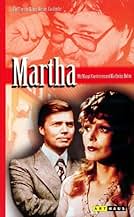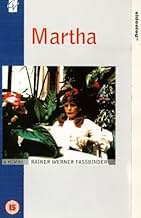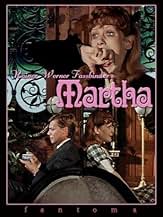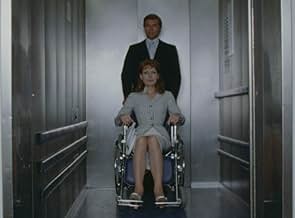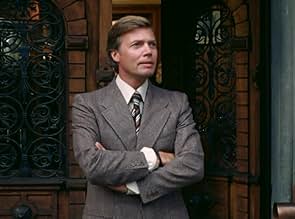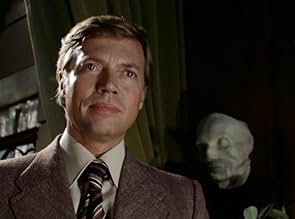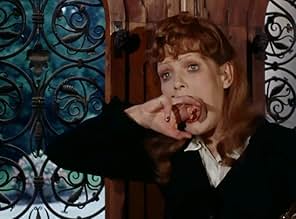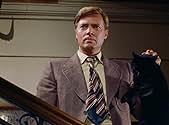Martha
- TV Movie
- 1974
- 1h 56m
After the death of her abusive father, the lonely librarian Martha marries an equally vile businessman - Helmut. The cruel and torturous nature of their relationship leads Martha to believe ... Read allAfter the death of her abusive father, the lonely librarian Martha marries an equally vile businessman - Helmut. The cruel and torturous nature of their relationship leads Martha to believe Helmut might be trying to kill her.After the death of her abusive father, the lonely librarian Martha marries an equally vile businessman - Helmut. The cruel and torturous nature of their relationship leads Martha to believe Helmut might be trying to kill her.
- Awards
- 1 win & 1 nomination
- Taxi Driver
- (uncredited)
- Director
- Writers
- All cast & crew
- Production, box office & more at IMDbPro
Storyline
Did you know
- TriviaBecause of legal reasons, the film wasn't shown for over 20 Years. Cornell Woolrich right holders claimed that the film has a lot similarities to one of his novels. Fassbinder replied, that he first read the story after filming was complete. Nevertheless Woolrich got a writing-credit. The first German screening of a restored edition was in November 1997.
- Quotes
Helmut Salomon: [after forcing his wife to read an obscure book on dam technology and listen to his favorite music] See, Martha? Those things can be fun.
- ConnectionsFeatured in Fassbinder in Hollywood (2002)
The emphasis in Martha, which was apparently a made-for-TV movie that Fassbinder happened to squeeze out in the same year of his crushingly sad (and great) Ali: Fear Eats the Soul, is on, like in many of his films, the woman and how she has to somehow simply survive in the world of men and her circumstances. There may even be a slice of Bunuel here too, which I may be inferring with my critic hat on, as it's about this kind of perverse push-and-pull between this couple - Martha meets Helmut (frequent Fassbinder collaborator and muse during this melodrama period of films Margit Carstensen and Karlheinz Böhm respectively) after what is the first of many quasi- absurdly sad moments where her father dies of a heart attack on some steps in Rome - and how there's a slightly sado-masochistic side of things where it shouldn't make sense how she can stand him treating her... and yet, she does, and there's a perversely satirical edge to everything.
One should remember that Fassbinder during this time was submerged in Sirk influence too, though I don't know if I detected that so much, aside from some of the heightened melodramatic touches (and the ending, which is really TOO much, but hey, we're already there, why not). There's this underlying subtext to this all that made me think about rich, domineering men *and* the women who become subservient to them. Bohm, also from a few Fassbinder films as well as Peeping Tom, has the face of a man who may be a sadist, but in his mind does he think he's being *fair*? He has the attitude and demeanor of someone who probably would've been right at home in the Nazi party - not that his character espouses racist language so much - it's all in the demeanor and how he treats his wife. A key aspect though is we don't really see what he's like outside of Martha's purview: does he cheat on her (probably), does he act like this when he's off on his, uh, engineering gigs that he forces down Martha's throat (so he can, you know, talk with her about things that interest him), and what about that sexual appetite?
The moments where Helmut has his 'way' with Martha is telling, and it's the moments of the film (aside from when Martha really gets hysterical, per the hysteria of the script itself) where there's that Bunuelian sense of... oh, you rich folk, you're so wacky- depraved (and also, as part of the satire, lacking any compassion or soul). He is basically raping Martha to an extent - there's one scene where he kind of makes Martha sit out in the sun so she can 'tan', but her pale skin burns, she lies out naked, and he forces himself on her anyway. And what about Martha? Has she become traumatized by all of this behavior? The gas-lighting part shouldn't be overlooked, though that's only an element of the behavior he puts on her; when I mention 'Fifty Shades', obviously it's not as much a comparison in quality (this is Fassbinder in 1974 for godsakes AND Michael Ballhaus on camera) or in awareness. If 50 Shades knew what images it was really portraying and understood the pitch-black, barely traceable and might as well be a cold heartless drama worldview, it would look like Martha.
Oh, and Margrit Carstensen: like some of her work (though not all) for this filmmaker, at times she has a face where there's much more being said in the eyes, tension and fear and confusion and obedience and something that the character may be mistaking for love (or those few bits where it may be clear her father's death f***ed her up more than she's ever dealt with, not to mention her mother and her issues). What's remarkable is that Fassbinder, per the style he's going for which has some cold detachment and a provocation of the audience often to feel for the characters despite the coldness of the tone, still leaves room for Carstensen to make this woman all her own, and that she can find the unfolding tragedy (or tragedies) as each moment of this disaster of a marriage unfolds.
The story takes a little time to get going really - that scene at the amusement park on the roller coaster is what hooked me in - but once it does, Martha reveals itself as one of the sickest "comedies" about marriage ever made.
- Quinoa1984
- Apr 2, 2017
- Permalink
Details
- Release date
- Country of origin
- Languages
- Also known as
- Марта
- Filming locations
- Constance, Baden-Württemberg, Germany(Martha and M. Kaiser by the lake)
- Production companies
- See more company credits at IMDbPro
Box office
- Budget
- DEM 500,000 (estimated)
Contribute to this page


